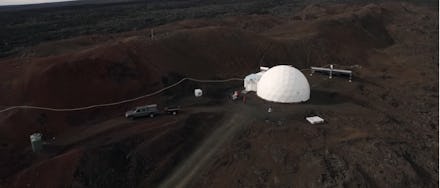Mars "astronauts" just came back to civilization after one year in isolation

Six volunteer "astronauts" just emerged after spending 12 months living in isolation inside a dome on top of a volcano in Hawaii.
The volunteers were part of a NASA-funded experiment called HI-SEAS. The group was chosen from a pool of astronaut-like candidates and then locked inside a 1,200-square-foot dome on top of the Mauna Loa volcano in Hawaii. The experiment is designed to study the psychological challenges that real astronauts will experience when they travel to Mars.
Now, after 12 months of isolation on simulated Mars, the volunteers have emerged.
Living on "Mars"
Living conditions in the dome are designed to mimic what humans will have to handle on a real trip to Mars, where they'll be stuck in a small space capsule with only the supplies they can carry.
During the simulation, the volunteers stayed inside a solar-powered dome with limited food and water supplies. Their only means of communication with the outside world was via email, which was set on a 20-minute time delay to mimic the lag that real astronauts would experience on the way to Mars. The volunteers could only leave the dome if they were suited up in a full-body spacesuit.
The volunteers used the spacesuits to check the solar panels and water supply outside the dome. They also wore them while conducting practice "Mars exploration trips," where they explored the surrounding lava tubes on top of Mauna Loa. The team also had to respond to several simulated emergencies like power outages and solar radiation storms.
During the 12-month experiment, the volunteers spent time working on individual research projects while simultaneously serving as the research subjects for scientists studying their behavior. From this and similar experiments, the scientists hope to gain insight into how to prepare future astronauts for the long-term isolation of a journey to Mars.
This is the fourth and longest HI-SEAS mission yet. If you want to spend some time on a volcano in Hawaii and help NASA get ready for Mars, HI-SEAS is recruiting for two more missions.